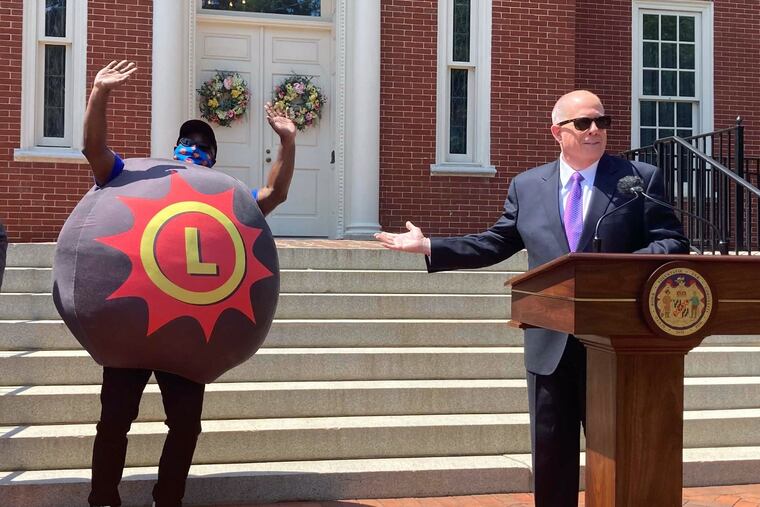Is it OK to offer a shot at lottery money to get people vaccinated? As bioethicists, we say yes. | Opinion
That the U.S. is contemplating vaccine payments while much of the world desperately awaits supply reflects a moral failing. But it’s clear that to vaccinate more Americans, we’ll have to get creative.

As many Americans shed their masks, COVID-19 vaccination rates are waning, and those who remain unvaccinated will likely need additional encouragement to move the needle. Amidst debate about the desirability and legality of vaccine mandates and passports, a potentially more palatable option is to use financial incentives to get people vaccinated.
Pennsylvania has offered a $25 commissary credit to vaccinated incarcerated people, though it has not announced any statewide incentive program. But Ohio Gov. Mike DeWine kicked off a new trend when he recently announced his “Vax-a-Million” campaign, a lottery to distribute $1 million prizes to five vaccinated adults and college scholarships for five vaccinated teens. Since then, Maryland Gov. Larry Hogan put forth a total of $2 million in lottery money for daily drawings of vaccinated Marylanders, and New York Gov. Andrew Cuomo sought to entice holdouts by offering scratch-off lottery tickets bearing a chance to win $5 million. New Yorkers can also get Yankees and Mets tickets for vaccines, those in New Jersey and Connecticut can get beers for shots, and young adults who get vaccinated in West Virginia will receive $100 savings bonds.
Is it ethical to dangle money or other benefits over those who have so far refused COVID-19 vaccination? As bioethicists who study the ethics of paying people to influence their behavior, we think so. If we can mandate vaccination — which we often do in workplaces and for school attendance — it seems clearly acceptable to incentivize it by encouraging objectively reasonable and morally praiseworthy behavior widely recommended by experts for the benefit of both the vaccinated and others.
Overall, the fact that U.S. policymakers are having to contemplate paying people to be vaccinated against COVID-19 while so much of the world desperately awaits vaccine supply reflects extreme privilege and a deep moral failing. But it’s clear that to get more Americans to roll up their sleeves, we’re going to need creative, multifaceted solutions. Policymakers should be clear, however, about what incentives can realistically accomplish, as well as their potential pitfalls, and design them accordingly.
One function of incentives is to raise awareness about the importance of COVID-19 vaccination — especially as mask mandates relax and the unvaccinated remain at risk. Public health departments have notoriously limited budgets for outreach, and a relatively small investment in creative incentives can generate substantial media coverage, multiplying impact. But creating broad awareness about the importance of vaccination won’t be enough. We also have to address specific gaps, such as a persistent lack of information about where and when people can get vaccinated.
» READ MORE: Two Pa. prisons have vaccinated more than 70% of inmates. An incentive program may be making a difference.
Another function of incentives is to directly influence decision-making about vaccination by sweetening the deal: a spoonful of sugar helps the medicine go down. Some people haven’t yet been vaccinated against COVID-19 not because they’re unwilling, but simply because it hasn’t been a priority for them. They don’t feel a sense of urgency, maybe because they’re at low risk of severe disease or don’t fully appreciate the ways vaccination can help others. For these individuals, incentives could help make the benefits of vaccination more immediate and tangible, thereby prompting action.
Yet, there are many different reasons holding people back from getting vaccinated, and incentives won’t work to address them all. Lotteries and beers aren’t going to do much for people worried about taking unpaid time off to get the COVID-19 vaccine and recover from its side effects. Incentives won’t ease the concerns of those whose resistance is rooted in mistrust or misinformation — and might even backfire by signaling that the risks and burdens of COVID-19 vaccination are higher than they really are. There are some Americans who don’t intend to receive a COVID-19 vaccine, no matter what’s offered. Offering incentives might also create an expectation that future shots, like COVID-19 boosters, will come with incentives, too, making for an expensive precedent.
» READ MORE: Should the government pay people to take the COVID-19 vaccine? | Pro/Con
Yet, even with their limitations and downsides, incentives can be a reasonable part of approaches to help get as many people vaccinated as possible — especially when they inject an element of fun. Paying people to do things they wouldn’t otherwise or don’t really want to do isn’t always a bad thing. Would you go to work without a paycheck? Let’s just make sure to also get creative about addressing other barriers, making the best use of available resources to address misinformation, engage relevant communities, and ensure that all who are willing to be vaccinated can easily do so.
Holly Fernandez Lynch and Emily Largent are both senior fellows at the Leonard Davis Institute of Health Economics and assistant professors of medical ethics and health policy at the Perelman School of Medicine at the University of Pennsylvania.